Book by Omar Farahat
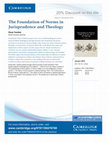
The Foundation of Norms in Islamic Jurisprudence and Theology, 2019
In this book, Omar Farahat presents a new way of understanding the work of classical Islamic theo... more In this book, Omar Farahat presents a new way of understanding the work of classical Islamic theologians and legal theorists who maintained that divine revelation is necessary for the knowledge of the norms and values of human actions. Through a reconstruction of classical Ashʿarī-Muʿtazilī debates on the nature and implications of divine speech, Farahat argues that the Ashʿarī attachment to revelation was not a purely traditionalist position. Rather, it was a rational philosophical commitment emerging from debates in epistemology and theology. He further argues that the particularity of this model makes its distinctive features helpful for contemporary scholars who defend a form of divine command theory. Farahat's volume thus constitutes a new reading of the issue of reason and revelation in Islam and breaks new ground in Islamic theology, law and ethics.
Journal Articles by Omar Farahat
American Journal of Comparative Law (forthcoming), 2023

Canadian Journal of Law and Jurisprudence, 2021
Even though the Islamic legal tradition advanced its own set of conceptions of time, modern schol... more Even though the Islamic legal tradition advanced its own set of conceptions of time, modern scholarship on Islamic law has not paid much attention to these conceptions. This paper argues that Islamic jurisprudents understood time in moral terms, not as a neutral container or mere background for action, but as a series of opportunities in which the authority of divine revelation and human moral reasoning are articulated. I suggest that the debates over the manners of compliance with divine commands in time were attempts at reaching some form of balance between the considerations of faithfulness to the demands of divine revelation and the practical imperatives of human temporal lives. This argument is advanced through a study of classical debates among jurists within the two major Sunnī schools of jurisprudence on the specific question of whether divine commands that are devoid of time indications should result in immediate or delayed performance.
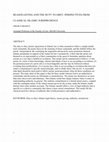
Journal of Law and Religion
The duty to obey juristic injunctions in Islamic law is often assumed to follow a simple model: G... more The duty to obey juristic injunctions in Islamic law is often assumed to follow a simple model: God commands, the jurists discover the meaning of those commands, and the faithful follow the jurists' interpretation. By examining the arguments advanced by some prominent classical Islamic jurisprudes in support of the claims for law's normativity, I show that the jurists saw themselves as representatives of their communities in the quest to formulate opinions about actions in a way that is faithful to revelation. This model can be summarized as follows: (1) the jurists, by virtue of their knowledge, inform individuals of how to act according to revelation; (2) the pronouncement of a jurist who is is knowledgeable and fair may be followed without revisiting their justifications; (3) everyone has a duty to act according to revelation that does not entail a commitment to specific moral principle, and to rebuke those who do not. A reasonable individual should be motivated to follow juristic pronouncements when all these conditions are present. The main claim of this paper is that the basic model wherein God is an authoritative commander and the jurists are informants is unsatisfactory. The jurists saw themselves as more than mere discoverers and informers. This Islamic model has unique features when it comes to understanding authority in general. The uniform committment to a formal moral source, coupled with the contingent nature of the robust reasons given by the system, make the Islamic model distinct from some modern accounts. The Islamic maodel offers a view of legal authority that is specific to a cohesive community that shares a basic moral commitment. This model fits the classical need for a theory of authority that is both persuasive and authoritative.
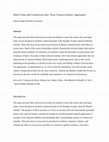
This paper presents three theoretical accounts developed to assess the moral value and legal stat... more This paper presents three theoretical accounts developed to assess the moral value and legal status of acts designed to promote commercial gain in the thought of major classical Muslim scholars. There has been an increased recent interest in Islamic commercial law and ethics in recent years. Much of the recent scholarship consists of practically inclined studies that tend to lump the Islamic tradition of evaluation of commerce under the principles of social justice and avoidance of harm. Our study of three selected scholars will reveal distinct approaches that are characteristic of classical Islamic ethical discussions: anchoring moral value in this world, attributing moral goodness to salvation in the next world, and finding a balance between these two approaches. Counterintuitively, we will see that the naturalistic view that ascribes moral values to things and actions was the most restrictive, whereas the dualistic model that focuses on salvation in the next world was markedly more permissive of commercial transactions.
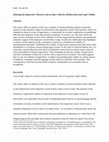
This article offers an analysis of the way a number of classical Muslim scholars treated the ques... more This article offers an analysis of the way a number of classical Muslim scholars treated the question of the normative impact of statements in the imperative mood. This question, which was standard in classical works of legal theory, is noteworthy for its direct implication in establishing links between linguistic forms and normative positions. It reveals to us with some clarity the logic of norm-formation in part of the tradition. It will be argued that the debates surrounding the normative impact of the imperative mood reflect a logic of collective deliberation that highlights a reliance on the authority of the community of jurists as a foundation of validity of jurisprudential principles. Establishing the validity of legal norms and processes that lead to their formulation is a common concern among legal systems. In the study of classical Islamic law, it is commonly assumed that the jurists derived substantive norms from revealed sources using the tools and methods of Islamic legal theory. This assumption locates the validity of legal norms and their formulation exclusively in divine will as expressed in revelation. This study suggests that we can view debates in legal theory as efforts in grounding legal validity in various sources of authority, including revealed language and the collective authority of the scholars. This corresponds to what has been described in analytic jurisprudence as a secondary rule of recognition.
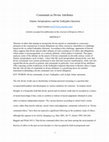
Theories of ethics that attempt to incorporate divine speech or commands as a necessary elements ... more Theories of ethics that attempt to incorporate divine speech or commands as a necessary elements in the construction of moral obligations are often viewed as vulnerable to a challenge based on the so-called Euthyphro dilemma. According to this challenge, opponents of theistic ethics suppose that divine speech either informs of a pre-existing set of values and obligations, which makes it inconsequential, or is entirely arbitrary, which makes it irrational. This paper analyzes some of the debates on the nature of divine commands in eleventh century works of Islamic jurisprudence (uṣūl al-fiqh). I show that Muʿtazilī jurisprudents advanced the view that divine commands were actions performed in time that had concrete manifestation, while Ashʿarīs argued that divine speech in general, and commands in particular, were eternal divine attributes. After exposing certain weaknesses in the Euthyphro-inspired objections to theistic ethics, I argue that the Ashʿarī idea of commands as divine attributes is a promising move for scholars interested in defending a divine command view of moral obligation.
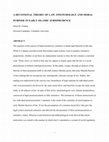
The Journal of Law and Religion, Mar 1, 2016
The question of the sources of legal normativity continues to haunt legal theorists to this day. ... more The question of the sources of legal normativity continues to haunt legal theorists to this day. While it is largely uncontroversial that modern legal systems claim to produce normative propositions, whether or not there are independent reasons to obey the law remains a contested issue. Those views, as varied as they may be, appear to largely agree that the law is a social phenomenon of definite ontological presence. In this paper, I argue, through an analysis of the theories of three prominent ninth to eleventh century Muslim jurists, that early Muslim theories of law-making did not incorporate any ontologically coherent concept of law. Rather, law-making was understood as the case-by-case formulation of legal opinions by individual jurists who were presumed to be driven by the same moral drive, and therefore occupy the same moral order, as all subjects of law. In spite of this ad hoc epistemological view, Islamic jurisprudence conceived of legal pronouncements as fully normative. The normativity of those unstructured ad hoc individual pronouncements, I maintain, is the result of the centrality of moral purpose to early Muslim theories of law. It was the presumption of a common moral drive that gave the legal system structural coherence and allowed the advancement of those pronouncements as normative claims. Whereas recent historical and anthropological work showed that moral motivation was central to the manner in which sharīʿa operated as a system of social regulation, this paper will argue, along the same lines, that the pietistic drive was both conceptually and structurally indispensable for the normative coherence of early Islamic jurisprudence.
Book Chapters by Omar Farahat
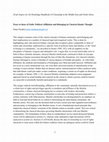
The Routledge Handbook of Citizenship in the Middle East and North Africa
This chapter examines some of the central concepts of human community and belonging and their imp... more This chapter examines some of the central concepts of human community and belonging and their implications in a number of classical legal and exegetical works. This is done by highlighting early and classical Islamic concepts that occupied a place comparable to ideas of nation and citizenship, understood as a specific form of political status and identity, or the "need to belong to a community," (as described in Heater 1990, 182), with an emphasis on the disciplines of Quranic exegesis and substantive law. I argue that, in several noteworthy texts in both of these scholarly domains, classical Muslim intellectuals continued to think of concepts pertaining to human association through the lens of tribe-like formations. For classical scholars, humans belonged to circles of kinship of various degrees of breadth and quality. As with tribal affiliation, the methods and boundaries of belonging were fluid and multi-layered. Affiliation did not occur in a strict institutional way, nor were there universal notions of identification in the writings of such scholars. Rather than an abstract nation, institutionalized within a political entity that individuals could join under certain conditions, acquiring a certain set of rights (as theorized, for example, in Heater 1990, 1-15), classical Muslim scholarship adopted a more pragmatic approach based on actual kinship and centered on the extent to which a person could be trusted as a peaceful or potentially harmful participant in a community.
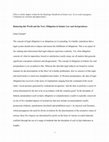
The concept of legal obligation is as ubiquitous as it is puzzling. It is hardly contentious that... more The concept of legal obligation is as ubiquitous as it is puzzling. It is hardly contentious that a legal system should aim to impose and ensure the fulfillment of obligations. This is an aspect of law making and enforcement that legal subjects experience routinely. Yet, what obligation consists of, what its imposition, breach or satisfaction exactly mean, are all matters that generate significant conceptual confusion and disagreement. The concept of obligation in Islamic law and jurisprudence is no exception to this. Whereas the idea that legal subjects are bound in various manners by the prescriptions of the Sharīʿah is hardly problematic, how to conceive of this legal and moral bond is a much less straightforward matter. In Western jurisprudence, the idea of legal obligation has received a wide array of explanations ranging from the command of the social order, social pressure generated by widespread recognition, and the duty to perform a course of action determined by the law to be in accordance with the common good. 4 In the discipline of Islamic jurisprudence (uṣūl al-fiqh), obligation or compulsoriness (wujūb) is typically conceived as one of five standard degrees of normativity that also include recommendation (nadb), permission (ibāḥah), reprehension (karāhah) and prohibition (manʿ). In classical uṣūl literature, which presupposes the need for divine revelation for the determination of the normative status of actions, those five degrees are determined by jurists on the basis of various revealed indicants (adillah) through the use of a range of methods that the discipline of uṣūl al-fiqh elaborates at lengths.
Book Reviews by Omar Farahat
Journal of Islamic Ethics, 2020
Essay for the Immanent Frame's Book Forum on Rumee Ahmed's "Shari'a Compliant" (Stanford, 2018)
Conference Presentations by Omar Farahat
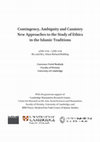
The conference brings new perspectives to Islamic discourses on ethics during the pre-modern peri... more The conference brings new perspectives to Islamic discourses on ethics during the pre-modern period across the disciplines of law, theology, philosophy, and adab. While ethics is defined in broad terms to encompass various scholarly discussions of morality, the conference adopts a contextualist approach to address the following issue: How did scholars think about ethics in their conception of the divine discourse on morality in light of the contingent nature of human reality? Earlier emic approaches to Islamic law led many to declare its literalist tendency an obstacle to rationalist ethics (as espoused, for example, by the Mu‘tazilite theologians, and by the philosophers). Exploring the question of contingency in Islamic ethics is predicated upon new findings in Islamic theories of law which not only underline jurists’ contextualist approaches to producing norms, but also the epistemological grounds of the theories which accommodate contingency (Johansen, Hallaq, Zysow, Gleave). In fact, in his recent work, Die Kultur der Ambiguität, Thomas Bauer has drawn attention to the complexity of Islamic normative discourses, depicting the tolerance of ambiguity as a key feature in the argumentation deployed in the production of the communally accepted in Islam. Evidently, these perspectives make room for adopting a contextualist approach to ethics; they help us overcome the tired opposition between scripturalism and rationalism as the only authoritative approaches to normativity in Islam.
Taking as central to its methodology Bauer’s perspectives, along with the contextual ethics of casuistry put forward by Jonsin and Toulmin in The Abuse of Casuistry, the conference is intended to explore further and more widely the contingency of ethical discourses in Islam. More specifically, discussions will include articulations of moral discourse in legal reasoning and argumentation, theological discussions of theodicy and divine command theories, the epistemology behind collecting moral knowledge in hadith collections, adab, aphoristic literature, rhetorical speeches and sermons, epistemological and ontological claims on morality, the reception of Aristotelian corrective philosophy of ethics and discussion of virtues. The conference will also serve to identify new questions, answers to which could give substance to the notion of the flexibility of norms across Islamic ethical discourses. Questions are to be answered from the perspective of each discipline, and speakers will be asked to reflect on the philosophical and theological implications that can be drawn. Comparative perspectives across the various Islamic sciences are especially encouraged.
In this paper I address the following questions: where do principles of Islamic jurisprudence com... more In this paper I address the following questions: where do principles of Islamic jurisprudence come from? What are their most basic premises, and how are they justified? In other words, what are the uṣūl of the uṣūl? My contention is that this kind of analysis reveals an image of uṣūl al-fiqh as an attempt to develop methods of reasoning that balance the need to remain faithful to revelation on the one hand with the necessity to make the legal system practical, comprehensible and effective, on the other hand. In other words, it is a discipline that managed the tension between authority and reasonableness in Islamic law.
The paper I would like to present to you today is an experiment in which I attempt to begin to ra... more The paper I would like to present to you today is an experiment in which I attempt to begin to raise some of the most pressing theoretical concerns that pertain to my work. Thus, I kindly ask you not to see it as a straightforward presentation, in the sense of making present in this epistemic space we are currently occupying, what is otherwise absent. Rather, it is better seen as an attempt to provoke the audience to respond to some of the conceptual complexities that, I suggest, are central to the work of those of us who study the history and development of ideas.
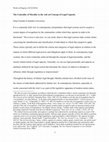
In this essay, I examine the concept of taklīf in some influential Ashʿarī works of uṣūl al-fiqh.... more In this essay, I examine the concept of taklīf in some influential Ashʿarī works of uṣūl al-fiqh. By situating the possibility of imposition of divine duties (taklīf) within the larger scheme of the dynamics of production of normativity and regulation of behavior that those works constructed, I explore the manner in which Ashʿarī jurisprudents conceived of the law’s applicability to particular individuals. We will see that, while the state of being mukallaf was largely seen as a matter of awareness and mental capacity, Ashʿarī jurisprudents paid particular attention to the possibility of being motivated by the moral purpose of the law. This internal and moral conception of legal capacity can be articulated with the Ashʿarī theories of causality, or the lack thereof. Given the very particular notion of creation of action that Ashʿarīs advanced, the ability to bear the burden of divine duties did not consist of the possibility of causing the actions in question, but of performing them knowingly of their moral aim. I argue that, rather than view legal subjects in light of their role as potential generators of particular consequences, the Ashʿarī philosophy of law was centered on the view of legal subjects as morally motivated agents. The idea of taklīf, therefore, was broader than capacity in the modern sense, since it pertained to the legal relevance of the agent’s action, rather than the validity of its consequences alone. As such, this concept represented a domain within which considerations of divine omnipotence were articulated with practical legal imperatives that concern the need to attach consequences to human actions.
Non-Peer Reviewed by Omar Farahat
Uploads
Book by Omar Farahat
Journal Articles by Omar Farahat
Book Chapters by Omar Farahat
Book Reviews by Omar Farahat
Conference Presentations by Omar Farahat
Taking as central to its methodology Bauer’s perspectives, along with the contextual ethics of casuistry put forward by Jonsin and Toulmin in The Abuse of Casuistry, the conference is intended to explore further and more widely the contingency of ethical discourses in Islam. More specifically, discussions will include articulations of moral discourse in legal reasoning and argumentation, theological discussions of theodicy and divine command theories, the epistemology behind collecting moral knowledge in hadith collections, adab, aphoristic literature, rhetorical speeches and sermons, epistemological and ontological claims on morality, the reception of Aristotelian corrective philosophy of ethics and discussion of virtues. The conference will also serve to identify new questions, answers to which could give substance to the notion of the flexibility of norms across Islamic ethical discourses. Questions are to be answered from the perspective of each discipline, and speakers will be asked to reflect on the philosophical and theological implications that can be drawn. Comparative perspectives across the various Islamic sciences are especially encouraged.
Non-Peer Reviewed by Omar Farahat
Taking as central to its methodology Bauer’s perspectives, along with the contextual ethics of casuistry put forward by Jonsin and Toulmin in The Abuse of Casuistry, the conference is intended to explore further and more widely the contingency of ethical discourses in Islam. More specifically, discussions will include articulations of moral discourse in legal reasoning and argumentation, theological discussions of theodicy and divine command theories, the epistemology behind collecting moral knowledge in hadith collections, adab, aphoristic literature, rhetorical speeches and sermons, epistemological and ontological claims on morality, the reception of Aristotelian corrective philosophy of ethics and discussion of virtues. The conference will also serve to identify new questions, answers to which could give substance to the notion of the flexibility of norms across Islamic ethical discourses. Questions are to be answered from the perspective of each discipline, and speakers will be asked to reflect on the philosophical and theological implications that can be drawn. Comparative perspectives across the various Islamic sciences are especially encouraged.